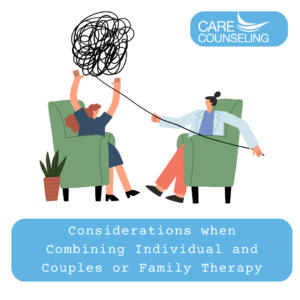 During therapy, you or your therapist may want to add an additional service to support growth in relationships. CARE Counseling is intentional about ethical practices when it comes to considerations such as who is the identified patient and who is the therapist to avoid dual relationships and maintain confidentiality. Let’s look at several considerations when determining who is the identified patient and who is the therapist. Next, we’ll address factors to consider.
During therapy, you or your therapist may want to add an additional service to support growth in relationships. CARE Counseling is intentional about ethical practices when it comes to considerations such as who is the identified patient and who is the therapist to avoid dual relationships and maintain confidentiality. Let’s look at several considerations when determining who is the identified patient and who is the therapist. Next, we’ll address factors to consider.
Who is the identified patient?
Each person in a couple’s relationship can generally benefit from some individual therapy sessions first and then adding in the couple’s therapy. For those starting couples therapy, choosing the individual who has the best insurance coverage as the identified patient is often a logical choice.
For an adult client who is already receiving individual therapy and wants to add couples/ family therapy, they are the identified patient (IP), and the focus will be on the individual and areas of concern that impact the couple or the family.
For family therapy, if a parent or caregiver is wanting support for a child who is struggling with their mental health, choosing the child as the identified patient is recommended since their focus will be on the child’s mental health and concerns that impact the family. However, if the parent or caregiver’s mental health is a primary focus that is impacted by family stressors, then it makes the most sense for the parent/ caregiver to be the IP.
Who is the therapist?
When the focus is on the individual and occasional time is spent with others whom the client has given their consent to be involved in treatment, then the same therapist is often involved with the IP and a partner(s) or family. Examples include a child who is seeing a therapist for individual therapy and the same therapist meets with a parent at the beginning or end of the session for check-ins or who has the parent present to support the child.
At CARE Counseling, parents and caregivers are involved in the intake and treatment planning of a child’s individual therapy, and then subsequent sessions focus on the child. For couples/ family therapy, the dyad or group seeking services will come together. The therapist may meet with others individually as part of the intake process to assess the safety and gather additional information; then subsequent sessions focus on the couple/ family.
It is recommended that when there are distinct roles such as providing individual and couples or family therapy, there are two separate therapists who provide services to avoid ethical dilemmas, by having clear roles and therapeutic boundaries.
Topics Related to Confidentiality
When others are involved in the care of a client, it is important for all of them to be aware of confidentiality and limits of confidentiality such as minor clients (under the age of 18) and couples. Establishing ground rules and having discussions around these early on is important. For example, in couples therapy, there is no “secret keeping”. If there is a “secret” that one person wants to process in therapy, that would be a great area to process with their individual therapist.
For more complex situations, therapists at CARE consult their profession’s Code of Ethics, utilize ethical decision-making, and consult with their supervisor to ensure that clients are receiving the best care.
Written By: Charlotte Johnson, MA, LPCC
We’re Here to help
Our wellness experts will be happy to take care of you. You can CLICK HERE to schedule an appointment now or call (612)223-8898.
Meet Clinicians
We’re united by our commitment to providing effective, relevant, and innovative mental health support at all stages of your journey. Click Here to find a therapist or find out more about who we are, where we come from, and how we live out CARE’s mission every day.
The professionals at CARE are actively collecting and creating resources to help with what you need and address frequently asked questions. We’re Here for You.



